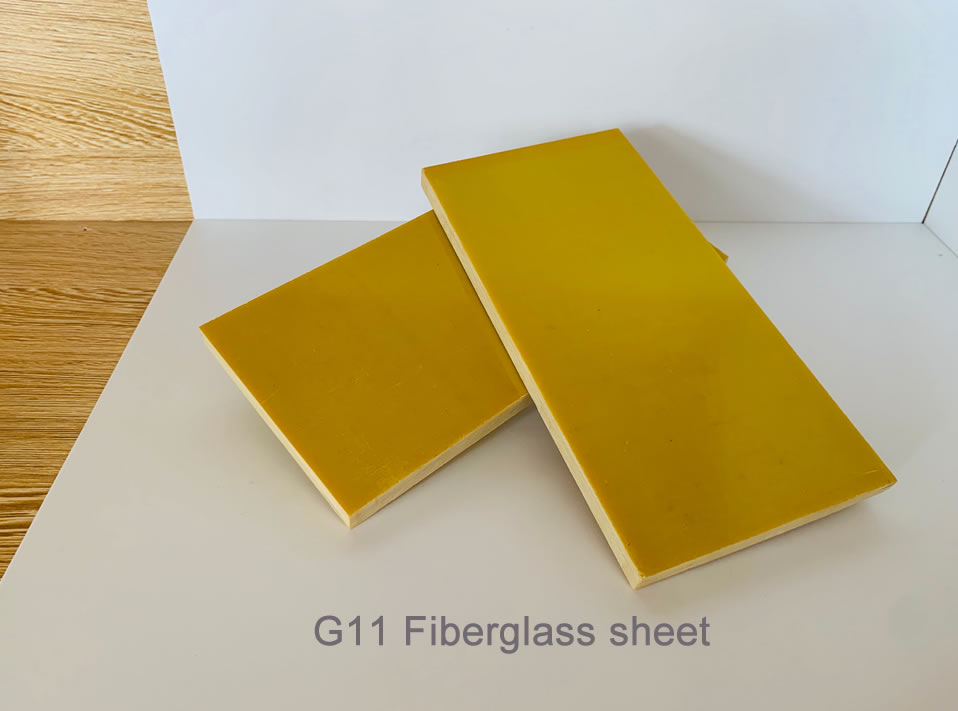G11 fiberglass sheet material is a hard cardboard-like insulating material made of imported electronic-grade alkali-free fiber glass cloth impregnated with imported epoxy resin, and added with corresponding imported flame retardants, adhesives, and other additives and processed by hot pressing. This material has high heat resistance, mechanical performance, and dielectric properties. G11 fiberglass sheet material is widely used in insulation components in motors, electrical equipment, as well as in aircraft, high-speed trains, transformer insulation boards, etc. It can also be used in humid environments and transformer oil, and is suitable for high-voltage switchgear, high-voltage switches, and other occasions.

Mechanical properties:
High density: The density of G11 insulation board is usually 1.9~2.0g/cm³, which can provide good mechanical strength.
High tensile strength: The tensile strength of the G11 insulation board is high in both longitudinal and transverse, which is usually between 300 and 350MPa. So G11 can withstand a large tensile force.
High bending strength:
The bending strength of the G11 insulation board is also very high, which is generally between 400 and 450MPa. So G11 can withstand a large bending load and is not easy to break.
High rupture elongation:
The rupture elongation of G11 insulation board is higher in both vertical and horizontal, which is usually between 5% and 8%. And G11 has good toughness and ductility.
Electrical performance:
Excellent insulation resistance: The insulation resistance of the G11 insulation board is usually between 1014Ω·cm, which can effectively prevent the flow of current.
Low dielectric constant: The dielectric constant of G11 insulation board is usually between 4.0 and 5.0, which can reduce the propagation of electromagnetic waves in the material and provide good electrical insulation performance.
Small dielectric loss factor: The dielectric loss factor of the G11 insulation board is small, which is usually between 0.015 and 0.025. So G11 can reduce the loss of electrical energy and improve electrical efficiency.
Heat resistance:
High thermal deformation temperature: The thermal deformation temperature of G11 insulation board is high, generally between 250 and 300 ° C, which can maintain good mechanical properties and insulation properties under high temperature conditions.
High fire resistance temperature: G11 insulation board has good combustion performance, and fire resistance temperature is usually between 180~200℃, which can effectively prevent the spread of flame and provide good safety performance.
Chemical resistance: G11 insulation board can resist the erosion of common organic solvents and acid and alkali substances and has a long service life.
Low water absorption: The water absorption rate of G11 insulation board is extremely low. After 24 hours of immersion, the water absorption rate is only 0.09%, which helps to maintain the stability of its electrical and mechanical properties.
Processing performance: G11 insulation board can be pressed, cut according to customer requirements and has good machinability and adaptability.
Material preparation
The main raw materials for G11 insulation include high-quality epoxy resins and reinforcement materials such as fiber glass cloth. The choice of these materials is critical and directly affects the performance and quality of the final product.
Coating process
Coating: The epoxy resin is evenly coated on the fiber glass cloth. This step needs to ensure that the amount of epoxy resin applied is moderate, which is to fully infiltrate the fiber glass cloth, and to avoid excessive resin resulting in product performance degradation.
Lamination: The coated fiber glass cloth is laminated to form a multi-layer structure. Parameters such as pressure, temperature and time need to be controlled during the lamination process to ensure tight bonding between the layers to form a strong epoxy bar or sheet.
Curing: The material that has been laminated needs to be cured. Curing is the chemical reaction of epoxy resin by heating or other means to form a stable network structure, thereby improving the strength and stability of the material.
The cured epoxy bars or plates are cut into products of different shapes and sizes as needed. Dimensional accuracy and surface quality need to be ensured during the cutting process to meet the specific requirements of customers.
In order to ensure the quality of G11 insulation materials, a series of quality tests are required. These tests include appearance quality inspection, dimensional accuracy measurement, chemical stability testing, etc. The appearance quality inspection mainly observes whether the surface of the product is smooth and flat, and whether there are obvious bubbles, cracks and other defects. Dimensional accuracy measurement ensures that the size of the product meets the deviation requirements specified in the standard. Chemical stability tests assess the stability of a material under chemical action.
If you need our products please write down any questions, we will reply as soon as possible.
There are three ISO certificates for quality certification. The certificates will be shown later. ISO
After receiving the advance payment, the production cycle is 15-25 days. And the transportation cycle should be calcul……
We supply with installation guide and user manual for each transformer. If you do not understand them. We will offer v……